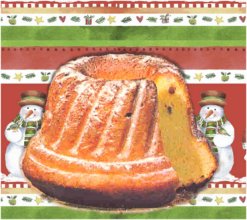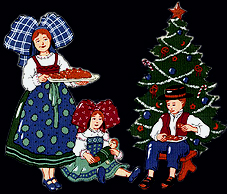
~ How
do you say Merry Christmas in France ? "Joyeux
Noël" ~ |
| Alsace is an eastern area
of France. Alsatian Holiday Traditions are filled with
the good smells of foie gras and pastries.
|

The kitchen is filled with the good smells of aniseed
and cinnamon from the Kugelhopfs, while in the living
room the Christmas tree is alight with candles. The
place of honour on the Alsatian table is given to
the goose, enthroned like a princess with her cabbage
attendants. It is on St. Martin's day, November 11,
that the systematic force-feeding of the geese begins.
Alsatian foie gras, the liver of force-fed geese,
was invented by Jean-Pierre Clause, chef to Marshal
Contades, the military governor of Strasbourg from
1762 until 1788. Since the Roman legions arrived
in Alsace and began using geese to guard farms, no
one has been able to resist foie gras, so meltingly
soft and delicious that a single bite can make a
grown man cry.
|

The table is covered in bredle, cookies scented
with aniseed, almonds and cinnamon, each bearing
a particular name, and cut out in the shape of
a star or person. We must also mention the gingerbread
made in walnut or boxwood moulds, and the hot chocolate
which is sipped slowly in the kitchen near the
big tiled stove, as one relaxes into a pleasant
state of well-being.
René Spiess, a familiar and beloved figure
from Riedisheim, was a baker for forty years before
leaving his ovens to take up writing. During the
holidays, with his wife Sophie, he likes to renew
ancestral traditions by making Berauwecka (or Bierawecka),
a traditional Christmas fruitcake from the Upper
Rhine, filled with good flavours from the orchard
and spices from the four corners of the earth.
|
 |
Above the earthenware
stove, a place of honour is given to a vase in which
the branches of fruit trees, traditionally cut on
December 4 (St. Barbara's day) will flower at Christmas.
Christmas Eve the story tellers
bring old legends to life as they sip mulled wine.
The house is filled with the fragrance of freshly
cut pine boughs, evoking childhoods past, and with
enticing smells from the kitchen. At Ribauville,
fire-eaters enliven the town square, providing a
glimpse into the entertainment of centuries of yore.
Before leaving for midnight mass,
a log sprinkled with holy water must be placed into
the fireplace, the ashes of which will protect the
house from lightning throughout the coming year. In
the old days, cherry soup was served at the Christmas
Eve meal following midnight
mass, and in the country, all farm animals were entitled
to an extra ration. But the real meal is on Christmas
Day: foie gras, goose with chestnuts on a bed of
red cabbage, followed by Màttkémmakas,
a Munster cheese flavoured with cumin, and finally
the Yule log cake, floating islands (meringues poached
in custard), and fruit salads.
|

|
|